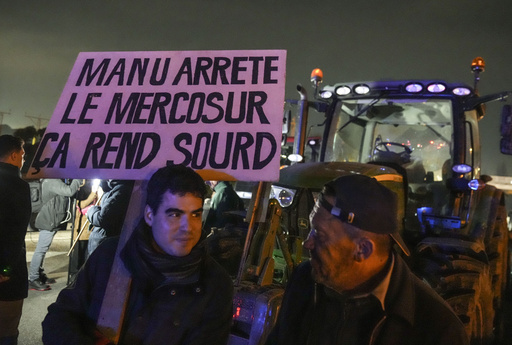
PARIS — French farmers are gearing up for large-scale protests set to take place on Monday against the EU-Mercosur trade agreement. They claim that this deal could jeopardize their income by permitting a large influx of agricultural products from South America, which are produced with looser environmental regulations.
The protests are expected to be widespread, with activities organized across the country, including demonstrations at prefectures and intersections. On Sunday night, one group utilized tractors to obstruct a highway south of Paris, while smaller actions have been occurring recently in anticipation of this week’s larger protests.
In 2019, the European Union and the Mercosur trade bloc—which includes Brazil, Argentina, Paraguay, Uruguay, and Bolivia—initially reached an agreement; however, its progress has been hindered due to opposition from farmers and certain European governments.
The timing of these renewed protests raises concerns over the possibility of finalizing the agreement during the upcoming G20 summit in Brazil on November 18-19, or in the following weeks. Additionally, EU agriculture ministers are convening in Brussels on Monday to further discuss the issue.
Leading these protests are unions such as FNSEA and Young Farmers, who are vehemently against elements of the agreement that allow for duty-free imports of beef, poultry, and sugar. They argue that such provisions would create an uneven playing field for European farmers. Coordination Rurale, a union affiliated with far-right groups, has vowed to initiate an “agricultural revolt,” including food transport blockades starting Tuesday in cities like Auch and Agen in southwestern France.
Supporters of the EU-Mercosur trade deal contend that it could greatly enhance economic relations between Europe and South America by removing tariffs on exports from Europe, particularly for machinery, chemicals, and automobiles. This would improve market access and open up profitable opportunities for businesses in Europe.
Earlier this year, farmers throughout France and other parts of Europe held demonstrations where they blocked roads and occupied government buildings, protesting against EU regulations and financial hardships, while also advocating for fairer agricultural policies and expressing discontent over the trade agreement.
French Agriculture Minister Annie Genevard has voiced her opposition to the EU-Mercosur agreement, pointing to dangers of deforestation and health risks associated with hormone-treated meat. In a recent interview with TF1, she stated: “We don’t want this agreement because it poses risks. It will import products, including those substances that are banned in Europe, contributing to deforestation while threatening our domestic production.”
President Emmanuel Macron has also expressed reservations about the agreement, insisting it should only proceed if South American producers comply with EU standards.
Frustrations among farmers are further aggravated by an audit from the European Commission that highlighted hormone use in Brazilian beef exports. The protests aim to exert pressure on the French government and EU officials to either block or renegotiate the trade agreement.
